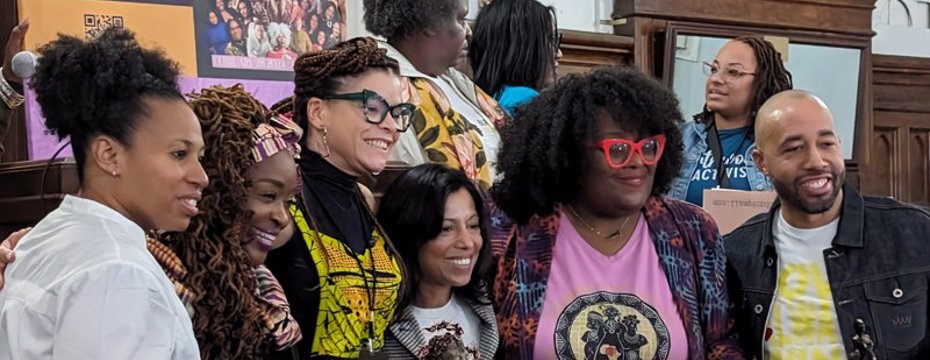
Anarcha Lucy Betsey Day of Reckoning Part 3
This post is authored by Pat James, aka "Mr. DoulaMatch", and summarizes the trip Kim and I made to Montgomery, Alabama to attend the third annual Anarcha Lucy Betsey Day of Reckoning conference. This conference is organized by artist and activist Michelle Browder and focuses on perinatal health and reproductive justice. We came to listen, learn, and reflect on how we can do more. We feel fortunate that our work with DoulaMatch affords us the opportunity to take action and support this work. We were also eager to see Michelle's Mothers of Gynecology monuments and visit important locations and museums from the civil rights movement.
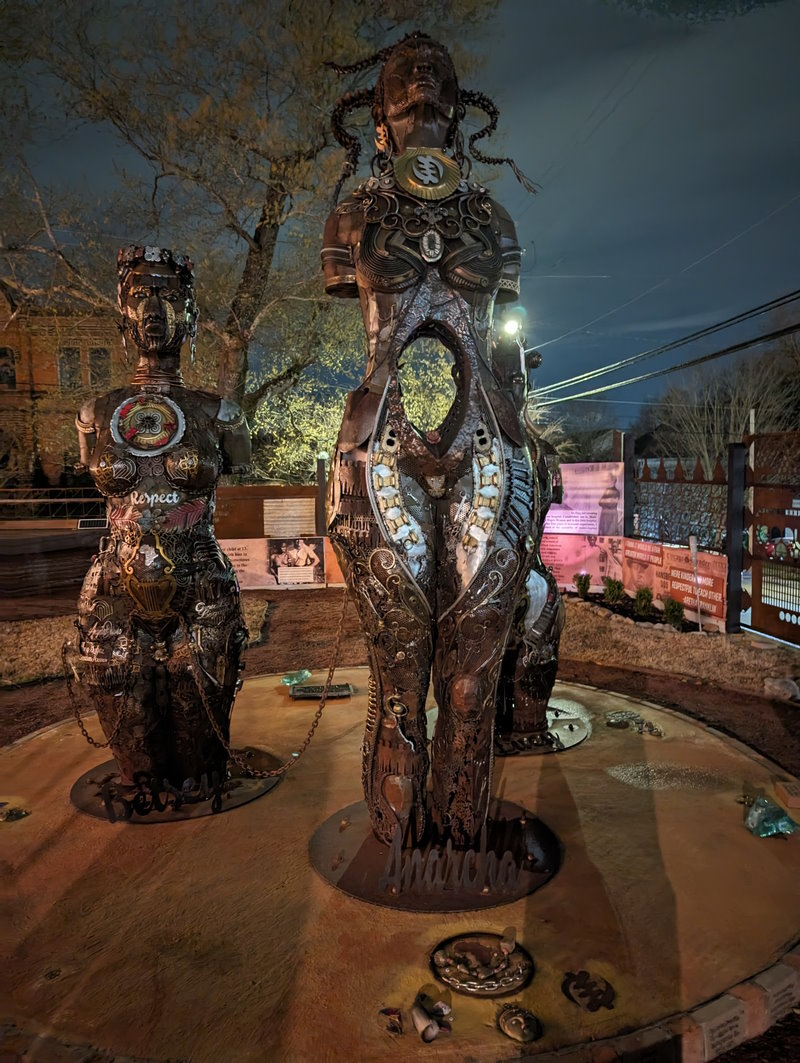
First, I would like to express my admiration for Michelle Browder and her many skills and accomplishments. During this trip I came to appreciate her as a national treasure. I believe that her art rises to the highest level where it amplifies our nation's most important messages and serves as a catalyst for change and justice. We were humbled by the quality of speakers she assembled and her ability to rally so many to her cause. She was also a wonderful host to everyone in attendance. On the first night she personally greeted us and continued to share her warm and welcoming spirit with us individually every day of the conference. One of my hopes with this post is to amplify her work and encourage others to learn and take action as we seek to improve perinatal health outcomes and address the inequities in our healthcare systems.
I have come to understand that this is a burning platform deserving our attention and action. Since 1987, maternal mortality rates in the US have doubled, making it among the worst among developed nations. And if you are Black, the mortality rate is anywhere from 3 times to 10 times the rate for white people. I learned that these differences extend across all socioeconomic levels, as exemplified by the experiences of Beyoncé, Serena Williams, and the tragic death of Kira Johnson. And while the US is among the worst in its peer group, the state of Alabama is almost at the bottom of results among US states. Several times I've heard the statement that Alabama is always grateful that Mississippi continues to firmly hold down the position of dead last.
Despite that, I don't think it is appropriate to disregard the plight of Alabama or to "other" it away as a regional problem. Neil Young wasn't wrong. But I would argue that many of Alabama's problems are not that different from those that afflict every state in the nation: Alabama just dials them up to 11. As I have learned and paid more attention to these issues, I have come to think that if the most difficult problems can be solved, it would seem likely that many problems in other communities are solved as a by-product of this work. I think that if the most difficult problems of inequity facing Black families can be resolved, then the similar issues in other communities will probably be fixed as well. If the problems in Alabama can be resolved, I hope that those solutions can be extended to and deliver benefits to every state.
The through line that connects the speakers and events of this conference is the story of J. Marion Sims, the so-called father of modern gynecology, and the efforts to reframe this narrative to focus on the stories and debt we owe to the enslaved Black women who were subjects of his experimental surgeries. Thanks to recent research and published works, a more complete understanding of Sims' life has emerged, a life focused on a quest for personal fame and wealth as a surgeon. Most of his work has been debunked as flat-out wrong and even harmful. Michelle Browder created monuments honoring the three women we know best as subjects of his experiments: Anarcha, Lucy, and Betsey. One of Sims' main areas of focus was on finding a surgical cure for fistula, an outcome of prolonged labor where tears are formed between the vagina and the bladder and/or bowel. This results in constant and chronic incontinence. Not only do victims suffer physically, but they are usually outcast pariahs within their communities and viewed as cursed women. Sims performed over 30 surgeries on Anarcha without anesthesia in failed attempts to cure her fistula.
Michelle Browder's monuments are crafted from discarded everyday items, the message being that there can be beauty in the discarded and damaged. Despite her fistula, Anarcha had 10 pregnancies and a loving husband, Lorenzo. And she was a midwife and nurse in her own right, catching dozens of babies from enslaved women as well as the white women who owned her.
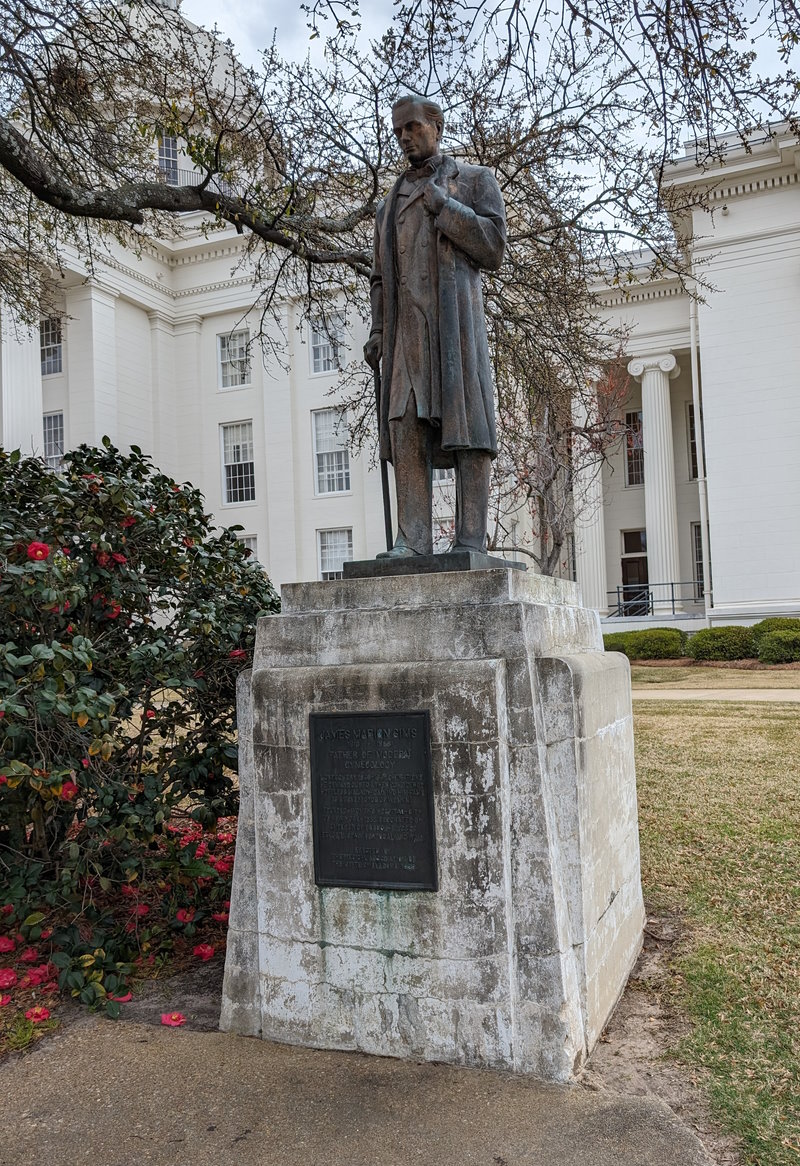
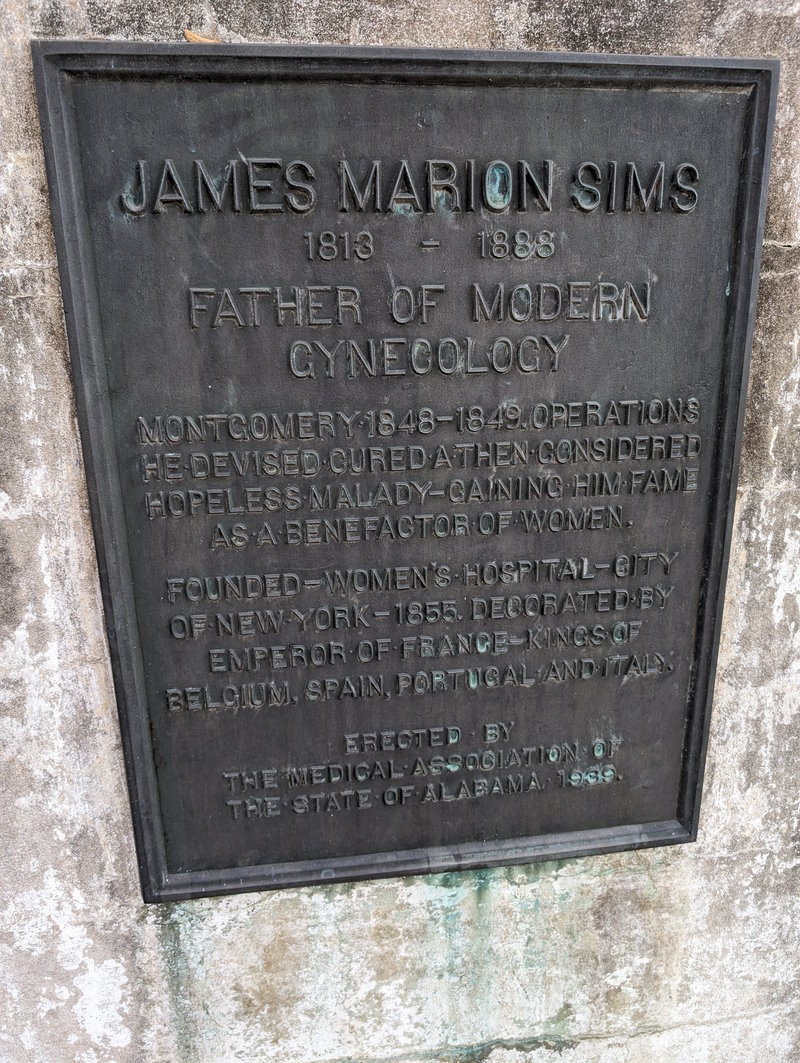
A statue of Sims was recently removed from Central Park, but another one remains in a place of honor right in front of the state capitol building in Montgomery, Alabama.
Michelle Browder recently purchased the building that was Sims' Montgomery home and clinic and is seeking to have the statue moved there where it can be presented within the context of what we now know about him and the women upon whom he experimented. Unfortunately, Alabama has a law prohibiting the removal of any statues more than 40 years old. Some cities in Alabama such as Mobile and Tuskegee have chosen to simply pay the fine to the state and remove statues in their community honoring leaders of the Confederacy. Michelle is raising funds to do the same in support of her efforts to move the statue of Sims. I encourage you to learn more, sign the petition, and donate to this cause at https://www.anarchalucybetsey.org/
On with the conference! Please note that this is not a comprehensive summary. I am choosing to focus on just a few highlights from topics that are most relevant to our work on perinatal health and that resonated particularly with me. Some speakers addressed topics of white supremacy and racism, as well as important health topics such as menopause that are not directly in the scope of our work with DoulaMatch. This is not to devalue these other speakers and topics, but I feel this post would go on to novella length if I tried to summarize everything, and at over 4,000 words it is already plenty long.
Confronting Bias in the Room
Presented by Jasmin Eatman, a graduate student from Emory University, this lightning-paced presentation addressed the biases inherent in scholarly research. She shared her findings that many of the men who are regarded as the fathers of modern research and statistical methodologies have embedded their own racist biases in core ideas at the center of all research today.
I was not aware, but in hindsight am not surprised by the fact that many of the concepts at the heart of statistical analysis behind most research were developed by racist white men. Thank you to Jasmin for shining a light on the role these men played in promoting phrenology and eugenics. Just as hospitals today are filled with instruments that bear J. Marion Sims' name (the Sims speculum), so are the foundations of research based on concepts such as p-values, chi-squared tests, and the normal distribution curve that were developed by these men who also promoted hateful and false theories. I found it to be a good example of the endemic nature of structural racism -- sometimes it is in the metaphorical air we breathe and the water we swim in whether we know it or not.
Just witnessing Jasmin Eatman's confidence and mastery of her material was a pleasure. At the conclusion, Kim turned to me and said, "that is an amazing young person who is going to do great things." I couldn't agree more. I also loved that her parents and fiancé were seated next to the stage. As a father of daughters, it warmed my heart to see her father blow her a kiss of love and respect.
Changing the Narrative
Having just finished reading JC Hallman's book Say Anarcha, I was particularly looking forward to this session with Karyn Parsons and author JC Hallman. Karyn Parsons played Hilary on The Fresh Prince of Belair. Karyn and JC met by chance when JC rented an Airbnb at Karyn's home, where they discovered common ground in their work. Karyn is the founder of Sweet Blackberry which tells little known stories of Black history and people for Black children to learn about their heritage.
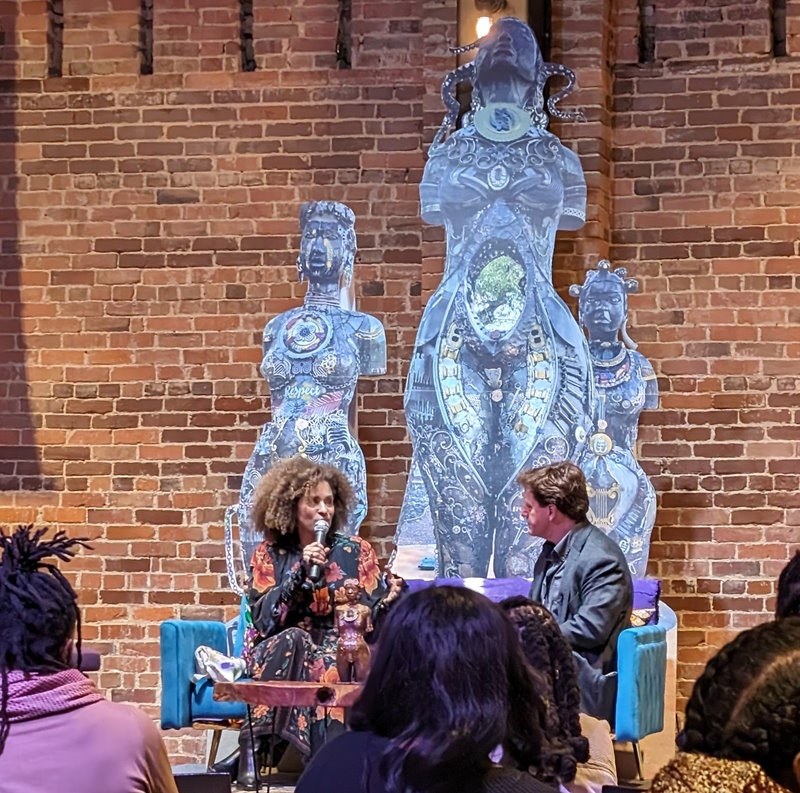
Hallman shared that there are many stories he was not able to include in his book, but are published on his YouTube channel, The Anarcha Archive.
One of the things I took away from reading his book was that while Sims was very successful at achieving fame and fortune, he was really a failure in most respects as a surgeon. He never cured Anarcha, and indeed after 30 fistula surgeries, the scarring and subsequent greater tearing rendered her completely incurable. His supposed cure for fistula was based on using silver suture thread with a suture clamp he devised; he later abandoned the clamp as a failure, leaving him with just silver suture wire, a prior innovation of another surgeon. When they finally started keeping close records of outcomes at his own Woman's Hospital in New York, it was found that he was killing more patients than anyone else there. He promoted ideas such as the ability to cure infant lockjaw (tetanus) through surgery; we now know this is entirely an infectious disease. He was vehemently opposed to the emerging standards of medical ethics.
I mention all that as prelude to something JC Hallman said during this session. He acknowledged that a criticism some quarters may lob at his work is that it is a projection of modern woke values on the past, a recasting of history through the lens of today's culture and values. His response to this is to highlight much of the above summary and the fact that source material clearly shows many of Sims' contemporaries in the medical profession were highly critical of him. He had many enemies and detractors. And we now realize that most of his work was technically wrong and ineffective.
One might wonder how exactly Sims pulled off the ruse of his own greatness and achievements. I learned from Hallman's book that Sims met with PT Barnum and was influenced by his strategies for self-promotion. He learned how powerful storytelling and shaping a narrative can be. Sims effectively wooed influential members of New York high society and worked the press to promote his message and drown out his critics. In this day of strategic misinformation through social media as well as captive traditional media, I think there are many parallels to Sims' life and the power a devious narrative can have to deny the truth.
Hallman fielded a question asking what it was like for him as a white man to take on this project. "Are you the right person to tell this story?" He said that the deeper he got into his research, the more he felt he needed to see it through to the end. He humbly responded that a different person may have done it better, and certainly would have done it differently. Ultimately, he felt that if he gave up and abandoned his work on the book, he would only be allowing Sims to continue to own his story.
Kim had previously met JC and introduced me to him. I let him know how much I appreciated his book and asked a few questions about the book's afterword which focuses on the story of fistula in Africa today. It was great to shake his hand and hear more of the story and his perspective.
Changing Maternity and Pregnancy Care Policy
ACLU of Alabama Executive Director JaTaune Bosby Gilchrist moderated a discussion with Dr. Stephanie Mitchell and Dr. Heather Skanes focusing on their experiences with midwifery and access to care in Alabama.
First off, I would like to acknowledge again the amazing speakers that Michelle Browder recruited: I was impressed and appreciated hearing directly from these eminently qualified leaders working at the heart of these issues. In 2022 Dr. Skanes opened one of only two non-hospital birthing centers in Alabama, and Dr. Mitchell is starting a new clinic in rural Gainseville, Alabama. And we had none other than the Executive Director the ACLU there just to ask the questions!
Midwifery was illegal in Alabama until 2017. Alabama does not participate in the expansion of Medicaid. There are over 300,000 people in Alabama with no healthcare insurance. Many areas of Alabama are considered to be perinatal health deserts due to lack of access to care.
Families in Gainesville, where Dr. Mitchell is opening her clinic, can drive 20 minutes to a public health clinic for a pregnancy test. It is a 40 minute drive to receive any other care.
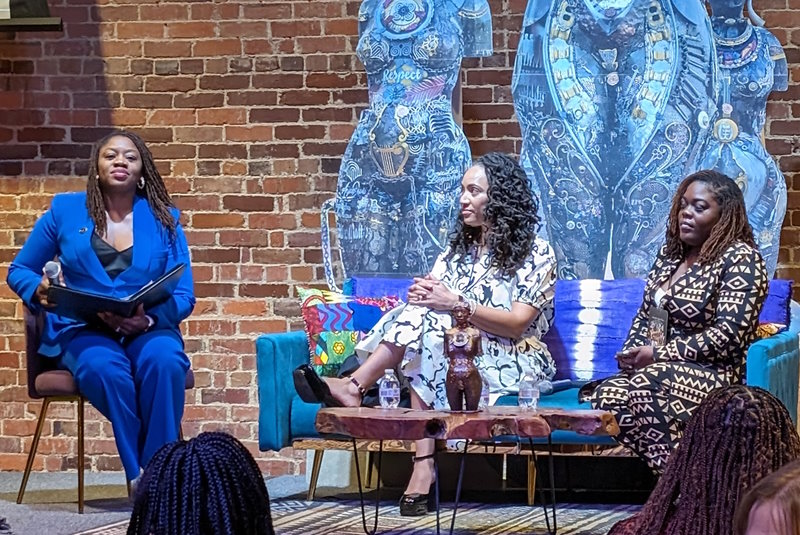
Dr. Mitchell said that when she sought to open her clinic, she was confronted by the restrictions placed on midwifery in the state of Alabama. The state requires midwives to be associated with an ObGyn. She thought, how hard could that be? It turned out to be impossible, as there simply aren't any doctors in her part of the state. In order to serve her patients she had to downgrade her credential from a Certified Nurse Midwife to a Certified Professional Midwife. This means she can no longer prescribe medication along with other restrictions on the scope of her practice, even though she is fully trained and certified to do so.
Dr. Skanes shared that Alabama legislators do not engage the healthcare community when they draft legislation on perinatal health issues. They lack the expertise themselves and fail to seek any informed input prior to setting policies. She contrasted this to the oyster farming industry: when the legislature is drafting bills regarding oyster farming regulations, they always bring the farmers in to help inform and craft the policy. Healthcare, not so much.
Dinner at the More Up Campus
I learned that Michelle Browder is not "just" an artist and activist. She is also an entrepreneur who has created a restaurant, after school programs, and a successful tour guide business. She has her own buses and trucks. She now owns the building where Sims lived and worked and has an ambitious plan to turn it into a museum and clinic, with lodging for visiting health care workers. On the site of the Mothers of Gynecology monuments she also has a very large old home where she welcomed us for a dinner with live music. She has dubbed the area the More Up Campus.
When we arrived, it seemed pretty crowded. We filled our plates with shrimp and grits, mac and cheese, collards and black-eyed peas and were just standing in a full room trying to balance everything and eat when Michelle saw us and said "no, no, no! I've got a place for you! follow me..." and proceeded to lead us through a few turns in the hallway we hadn't noticed to a small private room where we sat down next to a few other attendees (or so I thought).
We introduced ourselves to the person seated next to us. She said her name is Aletha, "kind of like Arethra, but with an L". Oh, very nice to meet you, we are Kim and Pat from Seattle, what brings you here? Aletha told us she worked in health equity in New York, and she was with the AMA, one of the conference sponsors. I thanked her for sponsoring the event and proceeded to tell her about the DoulaMatch features I built just for NYC to help families find doulas within the borough where they live.
It wasn't until later I discovered she isn't just "from the AMA." Dr. Aletha Maybank is a senior vice president of the AMA and its first chief equity officer with a long list of accomplishments in public service. Once again, I felt humbled and a bit of a dummy for blathering on about our little website. I'm trying to be a better listener, but it is a journey! This reminded me of one of my favorites from Covey's 7 habits: "seek first to understand, then to be understood."
Day Trip to Mobile
During our trip to Mobile, we visited the site of the Clotilda, Africatown, and the Mobile Medical Museum. We closed the day with another delicious dinner of southern cuisine. After another intense day, I think everyone appreciated the opportunity to let off some steam as the live band hit their groove before we returned to the buses for the two-hour return journey to Montgomery.
The visit started with a warm welcome from the city of Mobile. As part of our welcoming session, there was a special event in honor of Dr. Sharon Malone. I didn't mention her keynote talk on menopause because...well frankly I'm pretty sure I'm not the target audience. I skipped most of it and came in at the very end when the discussion turned to libido and sex after menopause. As Kim put it to me, "you sure got an earful today." I sensed that she was highly respected and had an impressive presence, but I didn't have a clue who she was or the story of her family.
Dr. Malone is a native of Mobile who was one of eight children in her family. She shared what it was like growing up in Mobile. Sharon's sister is Vivian Malone, who is famous for being the first Black person to graduate from the University of Alabama. Vivian was one of two Black students admitted in 1963 over the vehement and active opposition of Governor George Wallace and others. The other student was expelled "for her own safety", but Vivian was allowed to stay and complete her degree.
Dr. Malone has made significant contributions to healthcare over the past 36 years. While it is not relevant to this conference's focus or Dr. Malone's accomplishments, as I was preparing this post I was interested to learn that she is the spouse of former US Attorney General Eric Holder. Her sister Margie, an impressive leader in her own right, was also present. Again...I was blown away by the caliber of leaders Michelle Browder gathered for this conference. A representative from the city was there to read from recent commendations in honor of Dr. Malone, one from the city of Mobile and one from the state legislature.
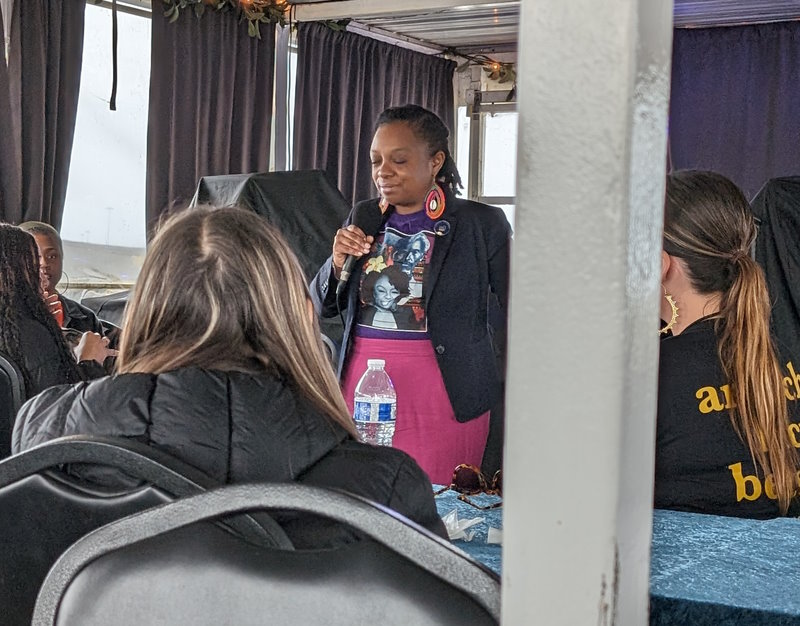
Joycelyn Davis, a descendant of the Clotilda and Africatown resident, was our guide on the riverboat that took us to the site of the Clotilda. Several times she mentioned the award-winning documentary film Descendant (available on Netflix). I downloaded it and watched it on the flight back to Seattle. I regret that I had not watched it before the trip, as it filled in context I missed during our brief visit. And most of all, I had no idea that our guide Joycelyn played a major role in the film. Questlove, another Clotilda descendant, was an executive producer of the film. The film helped me understand the impact of the Meaher family. This is the family who owned the Clotilda, enslaved the people on the ship, and still to this day are causing harm to their descendants. They still own the land surrounding Africatown and lease it to heavy industry, resulting in pollution and high rates of cancer among the Africatown residents. That's the short version. I encourage you to watch the film to get the whole story.
On a personal note, I was glad to have a free moment in Africatown to approach conference attendee Venus Standard. Her presentation at the DONA International conference in Minneapolis on the LEADoula program in North Carolina made a strong impression on me. I wasn't quite sure I recognized her in Montgomery. When I approached her I asked "are you..." and before I could complete my question she said "yes, I'm Venus Standard." I suspect she had spotted me eyeing her for the past day trying to determine if the person I saw was her. I told her how much I appreciated her work and that, speaking just for myself, I felt her talk was one of the highlights of the DONA International conference. It gave me hope to see the velocity at which she and her team are training and certifying new doulas in their community, focused on serving Black families in need. She proudly shared with me the recent news that a documentary focusing on the LEADoula Program had just won an Emmy.
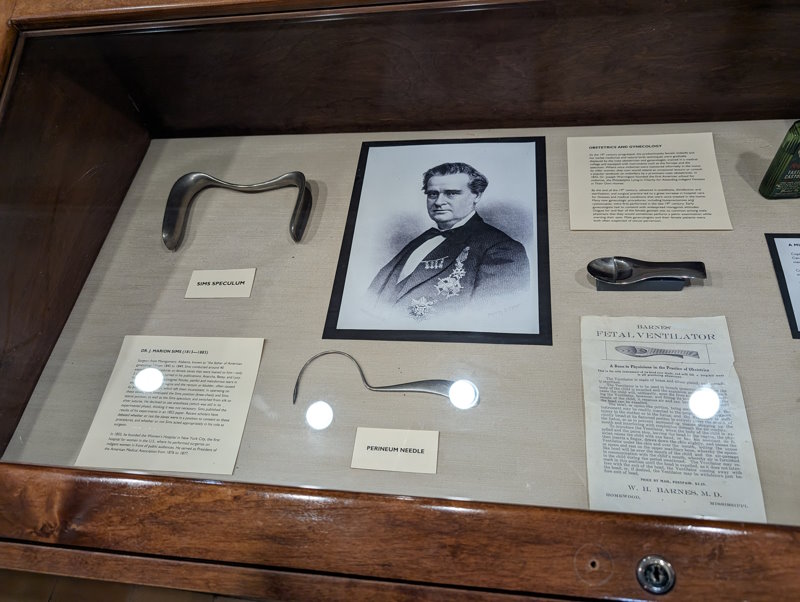
We also visited the Mobile Medical Museum, where we could see a display for J. Marion Sims including his speculum that he branded with his personal name. There was also a very early TENS unit, something Kim uses in her doula practice and has taught other doulas how to use for pain management during labor.
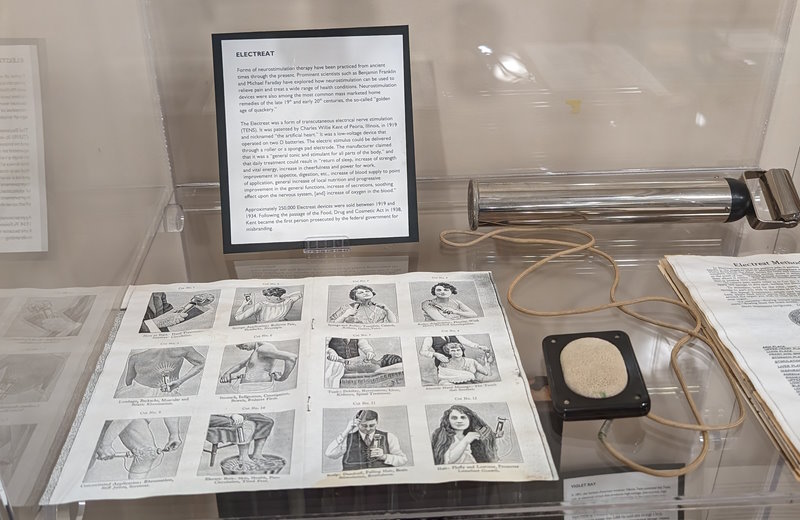
The day closed with a bang with dinner and a fantastic live band at Flava's.
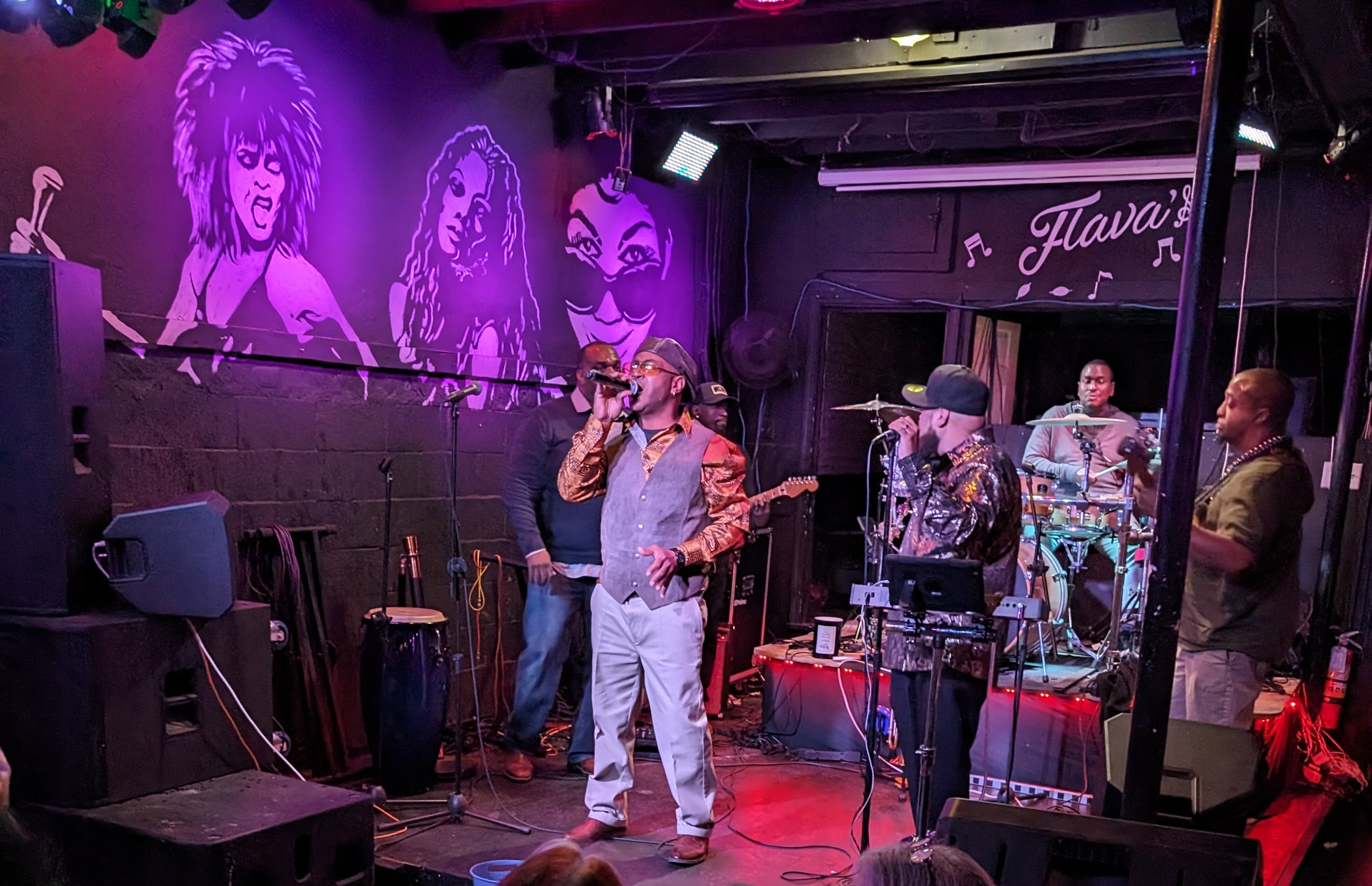
Chart The Course to Relocation
The conference ended with a panel discussion on the topic of moving the statue of J. Marion Sims from the Alabama state capitol building grounds to the new Mothers of Gynecology Clinical Museum that Michelle will be opening at the site of Sims' former office and home. The goal is to present it with the context and narrative we now know to be true.
I think this is an important distinction. These statues aren't being melted down or buried in a landfill. They are being moved to more appropriate locations. Nobody is erasing Sims. The record is being corrected.
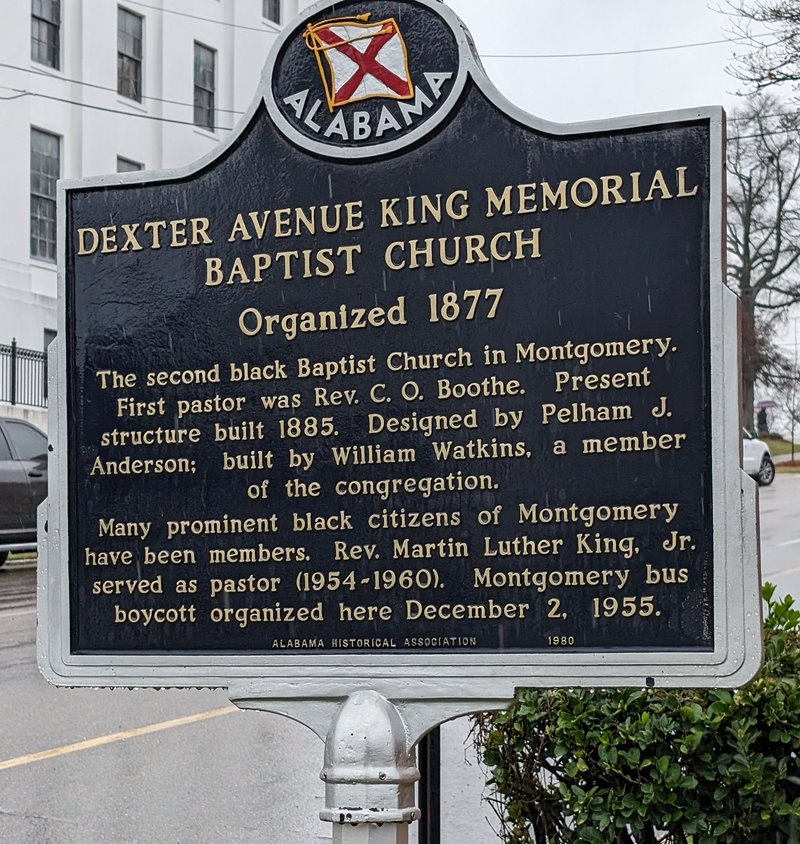
The meeting was conducted in the historic Dexter Avenue King Memorial Baptist Church, just steps away from the Alabama state capitol and Sims' statue. This church is the only church where Dr. Martin Luther King, Jr. served as a pastor, and was the site where the Montgomery bus boycott was organized. Just being in this space was very moving.
The panel featured:
- Dr. Aletha Maybank, American Medical Association senior vice president and chief equity officer
- Dr. Lee Sharma representing the Medical Association for the State of Alabama
- Professor Deleso Alford, Henrietta Lacks Advocate
- Charles Johnson, founder of 4Kira4Moms
- Dr. Veronica Pimental
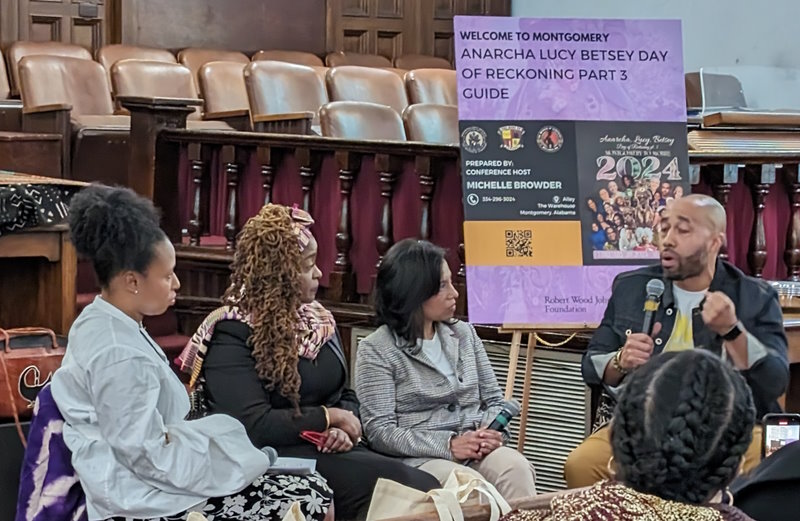
Dr. Maybank was present when the statue in Central Park was removed. The mayor had commissioned a review of all historical monuments in the city to determine if it was still appropriate to honor their subjects. The statue of Sims was the only one identified for removal.
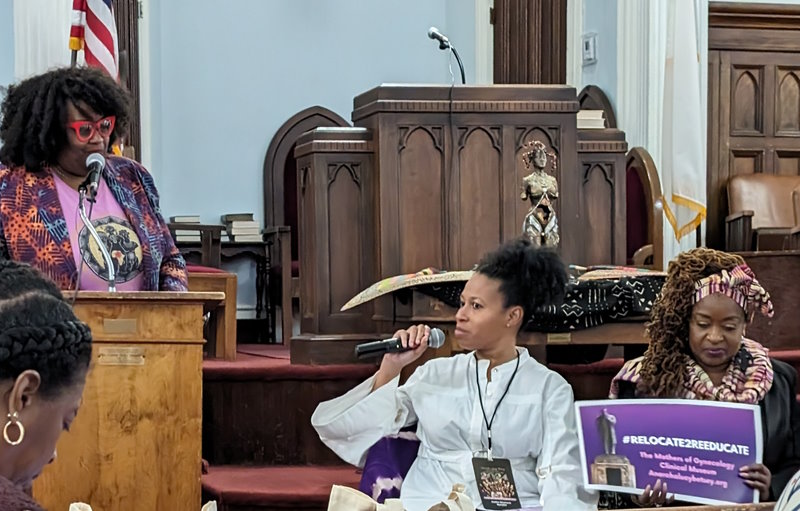
Dr. Sharma told us that during her education she learned that Sims was the father of gynecology and took that at face value until she later learned the true story of his life. She told us that she felt shame that she had been taught and accepted a myth. The Sims statue was erected by the state medical association, and so it is appropriate that they are involved in the discussion regarding moving it. Dr. Sharma said that after reviewing the facts, the Medical Association for the State of Alabama group considering this issue was unanimous in their support for moving the statue.
Last October at the DONA International conference I learned the tragic story of Kira Johnson's death. Hearing about it directly from her husband Charles Johnson was even more impactful. Kira hemorrhaged at Cedars-Sinai hospital for 10 hours without her condition being correctly diagnosed or cared for, ultimately resulting in her death. There was a failure of every standard procedure that should have been followed, despite Charles repeatedly imploring the staff to take note. Charles has made it his mission to address the institutional patterns of racism and inequities in healthcare. His foundation is 4Kira4Moms. A wrongful death suit resulted in a settlement, and now there is a civil rights investigation of the hospital. Two Cedars-Sinai nurses acted as whistleblowers supporting the claim that Cedars-Sinai has a long standing and endemic culture of racial discrimination. Charles is hopeful that the federal civil rights investigation may result in changes to federal funding of Cedars-Sinai. As he put it, we need to make this not just an issue about Black and white, but about "green" if change is to become a reality.
Charles shared some elements of his story that have not been widely publicized, including his discussions with Serena Williams' husband, Alexis Ohanion. Alexis told Charles that he felt if he had not been a cis white man with a personal fortune to back him up, Serena Williams may well have suffered the same fate as Kira Johnson. Charles said that throughout their ordeal, Kira continued to implore him to stay calm, because if he lost his cool he would perceived as the angry black man and a threat.
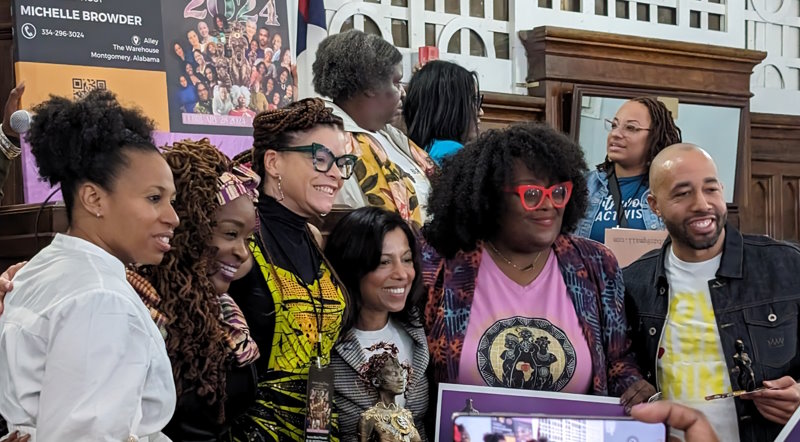
As we closed, Michelle brought us back to the goal of relocating the statue. She needs funding to address the legal challenges in opposing the state law that prohibits removal of statues that are more than 40 years old, as well as for the logistical support of actually moving it to a new location at what is now her building at 33 South Perry Street, formerly Sims' home and clinic. Please consider signing the petition and making a gift at https://www.anarchalucybetsey.org/
Conclusion
That's a wrap. Thanks for sticking with me through this, it was a long post! I hope that you found it informative, and that you feel inspired to learn more and take action in whatever way you can.
And if you work in perinatal healthcare, please consider attending the conference next year for Part 4 when Michelle plans the grand opening of a clinic on the site of Sims' former home.
